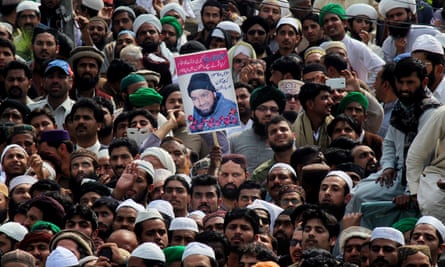An estimated crowd of more than 100,000 people have attended the funeral of Mumtaz Qadri, in a massive show of support for the convicted murderer of a leading politician who had criticised Pakistan’s blasphemy laws.
The vast gathering on Tuesday centred on Liaquat Park in Rawalpindi, where a succession of clerics made fiery speeches bitterly condemning the government for giving the go-ahead for Monday’s execution of Qadri, a former police bodyguard who became a hero to many of his countrymen after he shot and killed Salmaan Taseer, the governor of Punjab province, in 2011.
Fearing violence, authorities closed schools and beefed up security in both the garrison city of Rawalpindi and neighbouring Islamabad, the capital. Key roads were closed to traffic and the “red zone” near important government buildings was sealed.
Many people had travelled from around the country to attend the funeral, and crowds spilled out of the park on to the adjacent thoroughfare where throngs crushed around the flower-strewn ambulance that eventually brought Qadri’s body to the event.
Some of the all-male crowd wore “I am Qadri” signs around their necks while others held up the front page of the Ummat newspaper for bypassers to kiss, which was entirely covered with a photo of Qadri’s dead and garlanded body.
Many in the crowd were furious with the courts for convicting Qadri, with the governing faction of prime minister Nawaz Sharif’s Pakistan Muslim League for not ordering a presidential pardon, and with the media for agreeing to a strict news blackout on the protests.
Despite the huge numbers of mourners, none of the fleet of satellite trucks representing Pakistan’s numerous television stations were in attendance.
Sajjad Akhtar Abassi, a lawyer wearing the black suit and tie of his trade, condemned the supreme court for upholding Qadri’s death sentence last year.
“It is a court of law, not a court of justice,” he said. “Islam is a religion of peace and harmony but it does not allow anybody to use wrong words against the prophet or any other holy character.”
Qadri’s supporters believe he was justified in killing Taseer as he left a restaurant in Islamabad in 2011 because he had called for the pardoning of a poor Christian woman who had been convicted under blasphemy laws, which he also condemned.

The blasphemy laws are much criticised by human rights groups who say hundreds of people, mostly members of religious minorities, have been convicted for insulting Islam, often on flimsy evidence.
“The government can never change the blasphemy law because we are a nation of Muslims and the constitution already protects the position of minorities,” said Abassi.
The extreme sensitivity of the issue was reflected in the silence of Pakistan’s usually voluble politicians on the decision to execute Qadri.
On Monday night, video footage appeared online showing the information minister, Pervaiz Rasheed, being heckled by passengers in the departure lounge of Karachi airport.
One politician who did comment was the minister for religious affairs, Pir Muhammad Amin Ul Hasnat Shah, who released a statement that described Qadri as a martyr and urged people to participate peacefully in his funeral.
